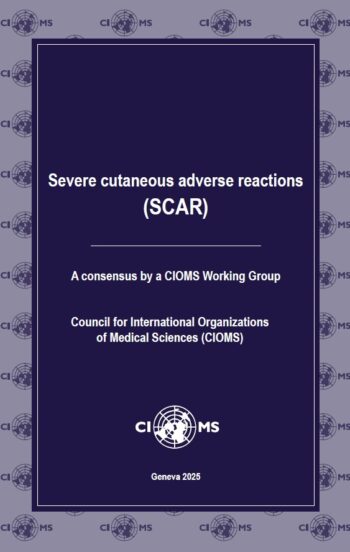
Download the report here: – Severe cutaneous adverse reactions consensus report
Severe Cutaneous Adverse Reactions – SCAR

Participants at the fourth meeting of the Working Group, held on 7 October 2021
Background
SCAR are an important health challenge and a limitation to the safe and effective use of medicines. Premarketing randomized clinical trials have limited power to detect SCAR, and there is a lack of specific diagnostic tests for SCAR which depend on subjective causality assessment methods.
SCAR are rare but serious adverse effects, posing substantial hurdles to drug developers, medicines regulators and health professionals / patient care.
At the pharmaceutical industry level, we can observe:
- The lack of guidance regarding SCAR in special populations, especially cancer patients, patients with pre-existing autoimmune diseases, elderly, and children;
- The need for comprehensive and systematic workflows for safety data capture and analysis;
- The lack of consensus for better clinical practice.
At the regulatory level we can observe:
- The lack of harmonized definitions for SCAR case qualification, the need for ensuring completeness of safety assessment and management in drug development, as well as consensus guidance on the design of studies to develop and validate new technologies and biomarkers;
- The lack of evidence-based practice for pharmacovigilance and practice to monitor and manage SCAR in clinical trials during the drug development and post-marketing phases;
- The lack of relevant information provided in the Summary of Product Characteristics (SmPC) regarding SCAR: the “adverse effects information” is quite similar for all drugs even if they do not present the same risks of causing SCAR.
Furthermore, the magnitude of attrition during drug development puts an unsurpassable barrier for the clinical translation of new drugs: up to > 80% of new chemical entities fail to progress from phase I trials to application for regulatory approval. This has taken the industry to a point where a revision of existing strategy is overdue.
In clinical practice, there is mounting concern about the ongoing burden of SCAR, the emergence of SCAR related to novel biologics, and the increasing cost of diagnosis and management.
Working Group objectives
To establish a balanced, efficient, global perspective on SCAR detection, susceptibility factors, severity, outcome and probability through causality assessment tools, monitoring and management during the drug development and post-marketing phases.
Progress
- 1st meeting held on 2-3 February 2021 (virtual) Minutes
- 2nd meeting held on 13 April 2021 (virtual) Minutes
- 3rd meeting held on 29 June 2021 (virtual) Minutes
- 4th meeting held on 7 October 2021 (virtual) Minutes
- 5th meeting held on 13 December 2021 (virtual) Minutes
- 6th meeting held on 9 May 2022 (virtual) Minutes
- 7th meeting held on 12 September 2022 (virtual) Minutes
- 8th meeting held on 12 December 2022 (virtual) Minutes
- 9th meeting held on 14 March 2023 (virtual) Minutes
- 10th meeting held on 20 June 2023 (virtual) Minutes
The Working Group (WG) makes the minutes of its in-person and virtual meetings public. Persons and parties not part of the WG are welcome to give their feedback. This WG has now completed its work and its report was published on 29 April 2025.
CIOMS Working Groups usually take 2-4 years to finalize their consensus document and recommendations. Most groups hold two in-person meetings per year, with telework in between. The groups make use of collaborative efforts and capitalize on existing initiatives in order to provide output that is as comprehensive as possible, does not duplicate other efforts and has added value.
